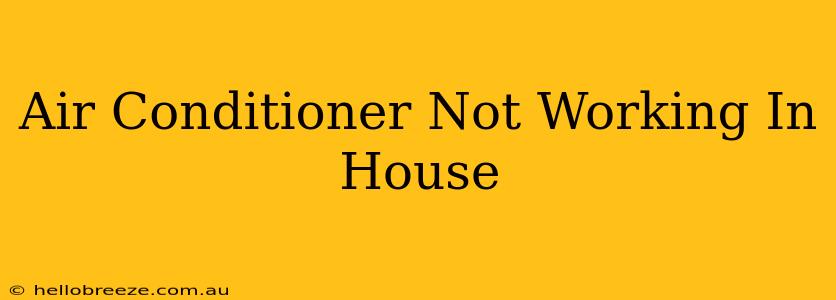Is your air conditioner refusing to cooperate on a sweltering day? A non-functional AC unit can quickly turn a comfortable home into an unbearable oven. Don't panic! Before you call an expensive repair service, let's troubleshoot some common problems you might be able to fix yourself. This guide covers common issues and solutions to get your AC working again.
Common Reasons Why Your Air Conditioner Isn't Working
Several factors can contribute to an air conditioner malfunction. Let's explore some of the most frequent culprits:
1. Power Problems: The Most Common Culprit
- Check the Circuit Breaker: The simplest and often overlooked solution! A tripped breaker is a frequent cause of AC failure. Locate your electrical panel and check for a tripped breaker related to your air conditioner. Reset it by flipping the switch off and then back on.
- Power Cord and Outlets: Examine the power cord for any damage, such as fraying or loose connections. Try plugging the AC unit into a different outlet to rule out a faulty outlet.
- Power Supply: Ensure the power supply to your home is functioning correctly. Check for outages in your area by contacting your local electricity provider.
2. Thermostat Troubles: The Brain of Your System
- Battery Check: If you have a digital thermostat, ensure the batteries are fresh and properly installed. A low battery can prevent the thermostat from functioning correctly.
- Thermostat Settings: Double-check the thermostat settings. Make sure it's set to "cool" and the temperature is set lower than the current room temperature.
- Thermostat Wiring: While less common for homeowners to troubleshoot, loose or faulty wiring in your thermostat can prevent it from communicating properly with the AC unit. This may require professional assistance.
3. Filter Issues: A Clogged Filter Restricts Airflow
- Dirty Air Filter: A clogged air filter is a major cause of poor AC performance. A dirty filter restricts airflow, causing the unit to work harder and potentially overheat. Consult your owner's manual for instructions on how to locate and replace the filter. A clean filter will significantly improve your AC's efficiency and longevity.
4. Frozen Evaporator Coil: A Sign of Restricted Airflow
- Ice Buildup: If you notice ice buildup on the evaporator coil, this indicates a problem with airflow. This could be due to a frozen coil, a clogged air filter, or a refrigerant leak. Do not attempt to defrost the coil yourself as this can lead to damage. Call a professional technician for this issue.
5. Refrigerant Leaks: A Serious Problem Requiring Professional Help
- Low Refrigerant Levels: Refrigerant is essential for the cooling process. A low refrigerant level will significantly reduce the AC's cooling capacity. You should not attempt to add refrigerant yourself. Refrigerant handling requires specialized equipment and expertise. Contact a qualified HVAC technician to diagnose and repair refrigerant leaks.
When to Call an HVAC Professional
While many minor issues can be addressed with simple troubleshooting, some problems require the expertise of a qualified HVAC technician. Contact a professional if:
- You suspect a refrigerant leak.
- The evaporator coil is frozen.
- The unit makes unusual noises.
- The problem persists after attempting basic troubleshooting steps.
Regular Maintenance is Key: Preventative maintenance, including regular filter changes and professional inspections, can help prevent major breakdowns and extend the lifespan of your air conditioning system.
By following these troubleshooting tips, you can often resolve minor AC problems and enjoy a cool, comfortable home. However, remember that safety is paramount, so don't hesitate to call a professional for more complex issues.

